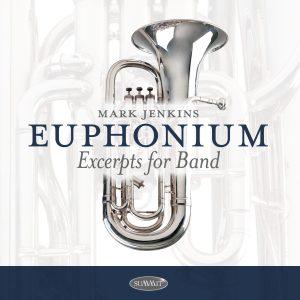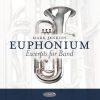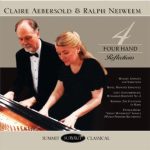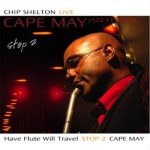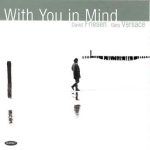Euphonium Excerpts for Band – Mark Jenkins
(See below for a complete listing of all 53 tracks)
Of all the instruments in the concert band, the euphonium plays one of the most diverse and challenging roles. In addition to being an occasional solo voice charged with playing countermelodies or solo lines, the euphonium is also frequently used as somewhat of a jack-of-all-trades – doubling different instruments, augmenting timbres, and filling out various musical textures. These range from the standard low brass section playing, to the delicate doubling of woodwinds. Regardless of the role assigned in any given piece of music composers and arrangers have throughout the last century required euphoniumists to be extremely versatile in terms of technique and style. It’s this versatility that audition panels look for in selecting candidates for employment with any professional concert band.
In preparing excerpts for an audition, a player should begin by asking a basic question: Is this passage soloistic or is it sectional? Or, to put it another way: Is the euphonium the primary voice or is it supporting another primary instrument? This may seem like an overly simplistic point, however, I find that we euphoniumists, as a whole, are more or less soloists at heart. We’ve all been weaned on the great solos of Simone Mantia, Herbert L. Clarke, and Jean-Baptiste Arban, and we are always thrilled when the euphonium is featured in any ensemble piece. Also, euphonium players have always been an “elite” group, often numbering only one or two horns per band. These circumstances give us a tendency to often interpret the ensemble part we play as if we were performing a concerto. While effective for an exposed, soloistic passage, this may not be the best choice while doubling, for instance, the tuba section in the opening of Holst’s First Suite in E-flat. In preparation for an audition be sure that each excerpt performed is interpreted in context, keeping in mind the musical texture and surroundings from which it is extracted. In short, euphoniumists must become experts in the playing characteristics and styles of all the band instruments in order to effectively support them when called upon to do so.
The goal of this recording is not to present a definitive version of these excerpts, nor to give a comprehensive list of every excerpt that could possibly show up on an audition list. Rather, I hope to provide some basic principles of technique and style as they apply to a selection of excerpts, which have become standard repertoire in euphonium auditions over the past thirty years and represent a wide variety of styles and roles that the euphonium is called upon to fill. These principles can then be used as a starting point to create one’s own interpretations.
In addition to this CD, take the time to listen to a complete recording of each piece. Recording oneself is also an invaluable tool in developing absolute rhythmic and stylistic accuracy in performance.
Above all, remember that at the end of the day audition committees are made up of musicians who want to here great music played– even if it is in excerpt form. All things being equal, they want to hire the one who plays the most music, not just the most notes.
- 1:52 Introduction on march style
- 1:10 Commentary on “Stars and Stripes”
- 1:31 John Philip Sousa “The Stars and Stripes Forever”
- :50 Commentary on “The Invincible Eagle”
- 1:31 John Philip Sousa “The Invincible Eagle”
- :36 Commentary on “Army of the Nile”
- 1:18 Kenneth Alford “Army of the Nile”
- :37 Commentary on “The Melody Shop”
- 1:40 Karl L. King “The Melody Shop”
- :32 Commentary on “The World is Waiting for the Sunrise”
- :20 Harry Alford “The World is Waiting for the Sunrise”
- :44 Commentary on “Commando March”
- :26 Samuel Barber “Commando March”
- 1:08 Commentary on “First Suite” (1)
- :19 Gustav Holst “First Suite in E-flat for Military Band”(1)
- :30 Commentary on “First Suite” (2)
- 1:06 Gustav Holst “First Suite in E-flat for Military Band”(2)
- :42 Commentary on “First Suite” (3)
- :38 Gustav Holst “First Suite in E-flat for Military Band”(3)
- :58 Commentary on “Second Suite”
- :35 Gustav Holst “Second Suite in F for Military Band”
- 1:27 Commentary on “Theme and Variations”
- 1:04 Arnold Schoenberg “Theme and Variations, Op. 43a”
- 1:03 Commentary on “Toccata Marziale”
- :41 Ralph Vaughan-Williams “Toccata Marziale”
- 1:08 Commentary on “When Jesus Wept”
- 2:39 William Schuman “When Jesus Wept”
- :34 Commentary on “Festival Variations”
- :28 Claude T. Smith “Festival Variations”
- :49 Commentary on “Rocky Point Holiday”
- :46 Ron Nelson “Rocky Point Holiday”
- 1:04 Commentary on Fiesta del Pacifico”
- :30 Roger Nixon “Fiesta del Pacifico”
- :53 Commentary on “Colonial Song”
- 1:32 Percy Grainger “Colonial Song”
- :44 Commentary on “Molly on the Shore”
- :34 Percy Grainger “Molly on the Shore”
- :50 Commentary on “Pineapple Poll”
- 1:13 Arthur Sullivan/arr. Mackerras “Pineapple Poll”
- :43 Commentary on “J’ai été au bal”
- :55 Donald Grantham “J’ai été au bal”
- :30 Introductory note on transcriptions
- :53 Commentary on “Festive Overture”
- :43 Dmitri Shostakovich/ trans. Hunsberger “Festive Overture”
- :59 Commentary on “Roman Carnival Overture”
- 1:16 Hector Berlioz/trans. Safranek “Roman Carnival Overture”
- :42 Hector Berlioz/trans. Godfried “Roman Carnival Overture”
- :59 Commentary on “Aegean Festival Overture”
- :31 Andreas Makris/trans. Bader “Aegean Festival Overture”
- :47 Commentary on “The Cowboys”
- :34 John Williams/trans. Curnow “The Cowboys”
- :34 Commentary on “Finale from Symphony no. 4”
- :47 Pyotr Ilyich Tchaikovsky/trans. Safranek “Finale from Symphony no. 4″



